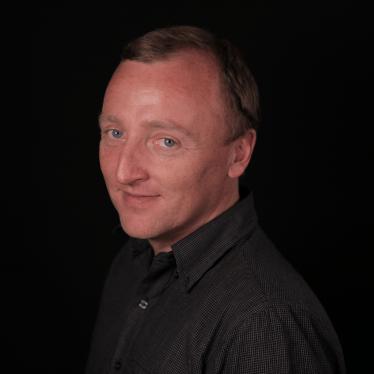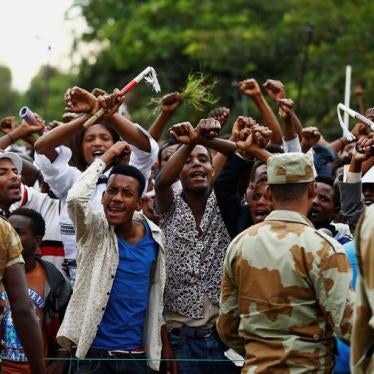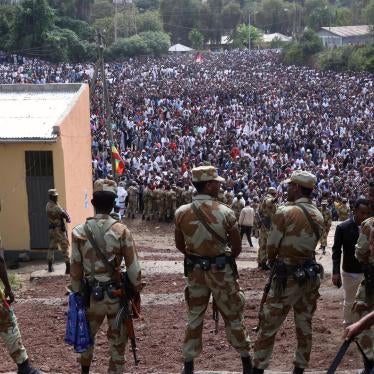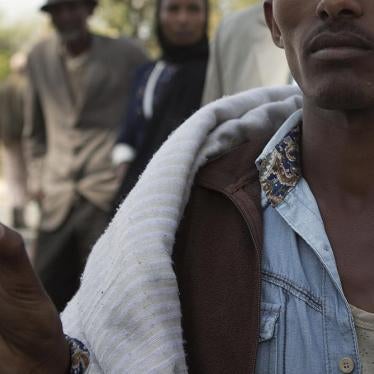In the past 10 months, Ethiopian security forces have killed at least 500 protesters and detained tens of thousands of people during largely peaceful anti-government demonstrations. In one August weekend alone, security forces gunned down at least 100 protesters.
A few days after that bloody weekend, Canadian officials, including Defence Minister Harjit Sajjan, met with Ethiopian Prime Minister Hailemariam Desalegn. A media briefing included pledges from Mr. Sajjan of commitments to future partnerships on peacekeeping, trade and security. There was no condemnation from Canada of the killing of non-violent protesters, nor a call on the Ethiopian government to allow peaceful demonstrations.
The protests began last November in Ethiopia’s largest region, Oromia, in response to the government’s approach to development. Demonstrations spread to the Amhara region and grievances began to focus on long-standing discrimination, questions of ethnic identity and the dominance of those connected to the ruling party in economic and political affairs.
There has been no sign that security forces intend to change their tactics or that the government will offer meaningful concessions, and the protesters have vowed to continue.
In short, Ethiopia is in the middle of a political and human rights crisis that could jeopardize Canada’s long-term interests in the Horn of Africa.
Ethiopian-Canadians have also been protesting in Ottawa, Toronto, Calgary and Saskatoon, keen to challenge Canada’s support for the repressive government. Ethiopia, with 85 million people, was the No. 3 recipient of Canadian aid dollars in 2014-2015.
Foreign agencies and development organizations understand that in exchange for access to Ethiopia, they need to limit and mute their public criticism of the government. As a result, Canada and other donor countries have kept silent about the repressive practices, afraid to risk their strategic relationships for development, security, peacekeeping and migration. They say they engage in “quiet diplomacy” to push their ally in the right direction. But this “quiet diplomacy” has been an abysmal failure in Ethiopia and has not prevented the dramatic downturn in the country’s human rights record.
The current crisis is the outcome of years of systematic attacks on basic freedoms that have resulted in complete suppression of the rights to peacefully express dissent, to hold officials to account or to obtain redress for abuses. There is widespread frustration with the government, but the government holds all of the seats in federal and regional parliaments since the 2015 elections. The government ensures loyalty by controlling access to the benefits of development – jobs, training, fertilizers, seeds, food aid – which is an unfortunate byproduct of the well-meaning aid from Canada and other Western donors.
Ethiopia’s courts have shown little independence on politically sensitive cases. The misuse of the country’s anti-terrorism law is illustrated through the ongoing trials of opposition leaders, activists and journalists. A Canadian citizen, Bashir Makhtal, is serving a life sentence after being convicted of belonging to a group the Ethiopian government considers a terrorist organization.
Tight restrictions on independent news media and non-governmental organizations mean there is little scrutiny of Ethiopia’s abusive security forces. Anyone seen as not supporting the government risks harassment or arrest, with little hope of a fair trial. The complete closing of political space has created a perfect storm of repression.
But Ethiopia’s allies are slowly breaking their silence. The African Commission on Human and Peoples’ Rights and the European Parliament have expressed concern about the killings of protesters. And the United States has been stronger than usual in condemning the use of excessive force during the crackdown. Last month, the UN’s top human rights official, Zeid Ra’ad Al-Hussein, said an international investigation and accountability are needed for the killings.
Canada’s new Liberal government, which has promised a new approach on Africa, should start with Ethiopia before the current crisis descends into an even more dangerous and irreversible situation.
Canada should strongly – and publicly – condemn the use of lethal force against protesters, push for an international investigation into the killings, and explore ways to hold the security forces to account for their brutality.
Such a public call would send a powerful message to the Ethiopian government that its security forces cannot kill and jail peaceful protesters with impunity. It would also send an important message to the victims and families, including those of Ethiopian-Canadians, that Canada is not ignoring their pleas for justice.
The world needs a strong, stable and prosperous Ethiopia, and at this critical juncture Canada should play a key role in making that happen.
|
Commentary
Ottawa Must Speak Out on Ethiopian Crackdown
Published in:
The Globe and Mail
Your tax deductible gift can help stop human rights violations and save lives around the world.
Tags
Most Viewed
-
November 25, 2019
A Dirty Investment

-
June 3, 2025
“They’re Ruining People’s Lives”

-
December 21, 2023
Meta’s Broken Promises

-
January 25, 2024
“We’re Dying Here”

-
February 19, 2018
“All We Want is Equality”




